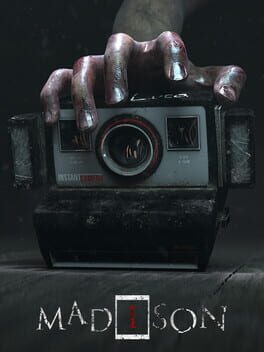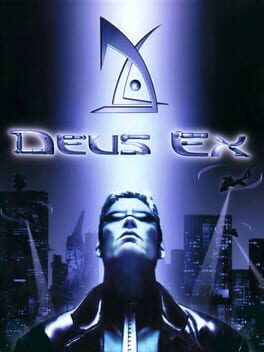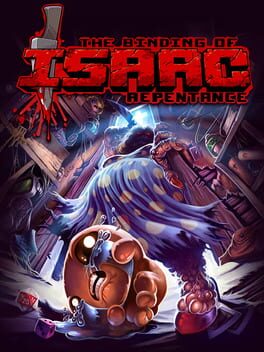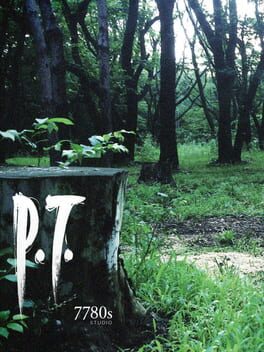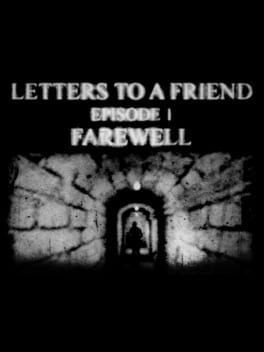ThinkingFella
985 Reviews liked by ThinkingFella
Infinite Craft
2024
Madison
2022
Probably the best of the post-PT psychological horror walking sims. Suffers a bit from the same common issue of this genre where sometimes there is no clear guidance as to what you need to do to progress the plot, but not nearly as bad as others. Ultimately though, anything that gets my non-gamer wife to sit down with me and play a game together is good in my book.
Deus Ex
2000
a triumph for scenario design aficionados. hour after hour of slices of the real world perfectly aligned into a playground of roving militants and hapless civilians. rarely does a game ever make its missions feel properly explorable while keeping it taut and linear at the same time, and yet deus ex routinely weaves both together. for every point A to point B underground lair with traps laid out in sequence there is a completely open venue, such as the suffocating catacombs and their dimly lit hallways giving way to the Champs-Élysées avenue of paris, with a bakery to pilfer contraband drugs from, a hostel with full bar access, and an arms dealer's loaded apartment, all off the beaten path from your main objective. military bases and science labs retain the layout you'd expect had you ever toured one, and you'll find that locker rooms, rows of cubicles, and break rooms feature just as prominently in the dungeon crawling as warehouses with guards patrolling or tightly wound mazes of laser tripwires and turrets. the authenticity and legibility of these areas comes first, and yet more often than not the designers still manage to weave in appropriate challenges without violating each location's fidelity in the process.
and really, dungeon crawling is the name of the game here, more or less. at least half of the game takes place in some sort of complex with a destination and a set of non-linear gates along the way, all of which serve as hinge points for the player to choose which resources to expend. the "immsim" label comes from just how many resources have all gotten slammed together in your control: lockpicks and "multitools" for bypassing security, ammo for many different varieties of firearms, bio-energy for utilizing your augmented abilities, and a slew of consumable items meant for tanking bullets, running past enemies undetected, or breathing under water for long periods of time. at its most taut, the game generally puts some sort of barrier up in your way and then a way around it, with the direct option being something like combat or picking a lock and the indirect option being finding a vent or waterway to circumvent the barrier. with enough of these situations back to back, the game hopes that you'll avoid sticking to one gameplay style in order to preserve your resources in that area for later when they seem more necessary; you can't crack every door with lockpicks, so you'll probably have to get your hands dirty or crawl on your belly here and there if you want to keep your picks for when the alternative is, say, running through a irradiated area. the nice part of this is that it truly does work: I explored, snuck around, and fought off enemies all in equal measure throughout the game through entirely organic response to each of the situations. the downside is by endgame the resource economy has completely turned in your favor assuming you've been rotating all of your options, making decisions on resource expenditure past a certain point much more about cleaning out your inventory rather than rationing.
when the game is firing on all cylinders, you'll get something like bunker III from the aforementioned catacombs. the area is two large rooms with a camera and turret tracking you at the back of the first room right in front of a cell full of hostages, multiple floors connected by stairs with archways for cover in the second room, and a back hallway swarming with rocket-strapped operatives where the camera/turret controls and a key to the next reside; a waterway additionally connects the front of the first room with the back of the second room. here you have actual tradeoffs to deal with: just grabbing the key and skipping the whole area by going through the waterway works, but the coverage in the back hallway can be intense depending on the AI's behavior, and your direct path to the key is blocked by strategically placed crates as soon as you leave the waterway. gunning for the security controls instead is feasible, and you can leverage the fact that hacking computers (sometimes?) pauses enemies for a bit to quickly run out, disable everything, and hop back in the waterway. you could also sneak in from the front and use an augmentation that hides you from cameras to avoid triggering the turret, and if you rescue the hostages with lockpicks instead of locating the cell key and leave the area early, you'll get the next area's key from their camp leader anyway. when the game constructs situations like these, they not only make the discrete tradeoffs impactful on the flow of a given level, they also weave it into the actual second-to-second movement, stealth, and combat as well.
at its worst it's the opposite: individual rooms with a guard or two and maybe a computer system or locked door stitched together by long hallways that inoculate each scenario from one another. in these sections the main appeal is exploration, either through finding nooks and crannies hidden from view or by reading the many "data cubes" with flavor text strewn around. it can still be exciting, especially earlier on when you don't have tools to detect enemies through walls and the suspense of moving around still persists. later in the game when one has more abilities at their disposal, breaking apart puzzles or barriers by jumping over them with enhanced height, moving large crates to use as stairs with enhanced strength, or shooting down doors with a mastered rifle ability can potentially make the monotony less apparent. some of the barriers don't fare quite as well due to a lackluster implementation: the hacking, for instance, is more or less free even with minimal upgrades, and for every camera you have to actually maneuver around there's at least four you'll disable without thinking just because the security terminals are easy to access. if the mission locations didn't adhere to the small details of real environments or didn't have cute little secrets in vents and lock-boxes, these issues would likely overcome the holistic experience and result in tedium.
the tiny details extend further than objects in the world as well. from early on when one of your augmented colleagues begins spontaneously complaining about getting the wrong can of soda from a vending machine, I had hoped that the scripting for the NPCs would stay high quality, and it absolutely persisted to the final moments of the game, when a civilian mechanic distraught by my actions pulled a gun on me behind my back. the tight pacing of the levels compared to a full open world experience allows for many of the individual NPCs to have unique dialogue, behavior, and even inventory when subdued. of these the most fascinating to me may have been a conversation with a chinese bartender in hong kong, who extolled the CCP's commitment to capitalist enterprise outside the purview of the new world order by emphasizing authoritarian nationalism against main character denton's idealized western democratic order. it's something you wouldn't see now in the xi jinping era and weirdly reflective of the game's almost non-ideological view of politics: people-facing organizations controlled by layers upon layers of shadowy organizations, each manipulating social behavior in a top-down way compared to the bottom-up class struggle and ideological superstructure of reality. not really a thought-provoking work unless you're particularly animated by vague gesturing towards "control" and "liberty," but at least you can tell the developers didn't take it too seriously either. there's roswell-style gray aliens running around for christ's sake.
and really, dungeon crawling is the name of the game here, more or less. at least half of the game takes place in some sort of complex with a destination and a set of non-linear gates along the way, all of which serve as hinge points for the player to choose which resources to expend. the "immsim" label comes from just how many resources have all gotten slammed together in your control: lockpicks and "multitools" for bypassing security, ammo for many different varieties of firearms, bio-energy for utilizing your augmented abilities, and a slew of consumable items meant for tanking bullets, running past enemies undetected, or breathing under water for long periods of time. at its most taut, the game generally puts some sort of barrier up in your way and then a way around it, with the direct option being something like combat or picking a lock and the indirect option being finding a vent or waterway to circumvent the barrier. with enough of these situations back to back, the game hopes that you'll avoid sticking to one gameplay style in order to preserve your resources in that area for later when they seem more necessary; you can't crack every door with lockpicks, so you'll probably have to get your hands dirty or crawl on your belly here and there if you want to keep your picks for when the alternative is, say, running through a irradiated area. the nice part of this is that it truly does work: I explored, snuck around, and fought off enemies all in equal measure throughout the game through entirely organic response to each of the situations. the downside is by endgame the resource economy has completely turned in your favor assuming you've been rotating all of your options, making decisions on resource expenditure past a certain point much more about cleaning out your inventory rather than rationing.
when the game is firing on all cylinders, you'll get something like bunker III from the aforementioned catacombs. the area is two large rooms with a camera and turret tracking you at the back of the first room right in front of a cell full of hostages, multiple floors connected by stairs with archways for cover in the second room, and a back hallway swarming with rocket-strapped operatives where the camera/turret controls and a key to the next reside; a waterway additionally connects the front of the first room with the back of the second room. here you have actual tradeoffs to deal with: just grabbing the key and skipping the whole area by going through the waterway works, but the coverage in the back hallway can be intense depending on the AI's behavior, and your direct path to the key is blocked by strategically placed crates as soon as you leave the waterway. gunning for the security controls instead is feasible, and you can leverage the fact that hacking computers (sometimes?) pauses enemies for a bit to quickly run out, disable everything, and hop back in the waterway. you could also sneak in from the front and use an augmentation that hides you from cameras to avoid triggering the turret, and if you rescue the hostages with lockpicks instead of locating the cell key and leave the area early, you'll get the next area's key from their camp leader anyway. when the game constructs situations like these, they not only make the discrete tradeoffs impactful on the flow of a given level, they also weave it into the actual second-to-second movement, stealth, and combat as well.
at its worst it's the opposite: individual rooms with a guard or two and maybe a computer system or locked door stitched together by long hallways that inoculate each scenario from one another. in these sections the main appeal is exploration, either through finding nooks and crannies hidden from view or by reading the many "data cubes" with flavor text strewn around. it can still be exciting, especially earlier on when you don't have tools to detect enemies through walls and the suspense of moving around still persists. later in the game when one has more abilities at their disposal, breaking apart puzzles or barriers by jumping over them with enhanced height, moving large crates to use as stairs with enhanced strength, or shooting down doors with a mastered rifle ability can potentially make the monotony less apparent. some of the barriers don't fare quite as well due to a lackluster implementation: the hacking, for instance, is more or less free even with minimal upgrades, and for every camera you have to actually maneuver around there's at least four you'll disable without thinking just because the security terminals are easy to access. if the mission locations didn't adhere to the small details of real environments or didn't have cute little secrets in vents and lock-boxes, these issues would likely overcome the holistic experience and result in tedium.
the tiny details extend further than objects in the world as well. from early on when one of your augmented colleagues begins spontaneously complaining about getting the wrong can of soda from a vending machine, I had hoped that the scripting for the NPCs would stay high quality, and it absolutely persisted to the final moments of the game, when a civilian mechanic distraught by my actions pulled a gun on me behind my back. the tight pacing of the levels compared to a full open world experience allows for many of the individual NPCs to have unique dialogue, behavior, and even inventory when subdued. of these the most fascinating to me may have been a conversation with a chinese bartender in hong kong, who extolled the CCP's commitment to capitalist enterprise outside the purview of the new world order by emphasizing authoritarian nationalism against main character denton's idealized western democratic order. it's something you wouldn't see now in the xi jinping era and weirdly reflective of the game's almost non-ideological view of politics: people-facing organizations controlled by layers upon layers of shadowy organizations, each manipulating social behavior in a top-down way compared to the bottom-up class struggle and ideological superstructure of reality. not really a thought-provoking work unless you're particularly animated by vague gesturing towards "control" and "liberty," but at least you can tell the developers didn't take it too seriously either. there's roswell-style gray aliens running around for christ's sake.
Bloodborne
2015
HENTAI WEED PUZZLES is a game about people above anything else. It cuts like a person, absorbs like a person, observes like a person, and moves like a person. To experience Ghost_RUS’s latest is to experience the feeling of sitting still while uncontrollably moving forward. It uses those rare pauses and moments of relief in life to their fullest potential.
This is an incomparable piece of work that exists in its own bubble. A bubble gently floating through the air ready to pop but living in complete tranquility while it still can. This will only get better with time.
This is an incomparable piece of work that exists in its own bubble. A bubble gently floating through the air ready to pop but living in complete tranquility while it still can. This will only get better with time.
Rain World
2017
my favorite game that i feel like i can't recommend. i adore the world and the creatures and the gameplay and movement. atmosphere is unparalleled.
sometimes it feels like bullshit, but i like the bullshit. the built-in rain world "remix" accessibility options are an extremely welcome addition for those who don't.
sometimes it feels like bullshit, but i like the bullshit. the built-in rain world "remix" accessibility options are an extremely welcome addition for those who don't.
Pikuniku
2019
P.T.
2014
An appealing terrifying Walking Simulator advertised in the most clever way possible.
P.T. doesn't has much of a story, as a playable teaser it doesn't need one though. Where it shines is the way it got advertised. After finishing it, it turns out to be a teaser of the now not so "9th" Silent Hill game made by Hideo Kojima and Guillermo del Toro starring Norman Reedus as the main protagonist.
It's debatable if this would have been a real Silent Hill game if it got released but it sure brought some fresh air to the franchise and finally wasn't another attempt to copy the story of Silent Hill 2. Silent Hill 4 seems to be the closest SH game when compared to P.T..
The puzzles are clever and the atmosphere is creepy as fuck. Lisa as a monster contributes a lot for the games scariness and so does that Fetus resembling the one from Davif Lynches Eraser Head, that was a shitty movie though lol.
Anyway its a shame the final game got cancelled since Kojimas take while maybe not accurate to the series still would have been interesting with it probably becoming the scariest game in the series since SH3.
8/10 cute demon fetuses.
P.T. doesn't has much of a story, as a playable teaser it doesn't need one though. Where it shines is the way it got advertised. After finishing it, it turns out to be a teaser of the now not so "9th" Silent Hill game made by Hideo Kojima and Guillermo del Toro starring Norman Reedus as the main protagonist.
It's debatable if this would have been a real Silent Hill game if it got released but it sure brought some fresh air to the franchise and finally wasn't another attempt to copy the story of Silent Hill 2. Silent Hill 4 seems to be the closest SH game when compared to P.T..
The puzzles are clever and the atmosphere is creepy as fuck. Lisa as a monster contributes a lot for the games scariness and so does that Fetus resembling the one from Davif Lynches Eraser Head, that was a shitty movie though lol.
Anyway its a shame the final game got cancelled since Kojimas take while maybe not accurate to the series still would have been interesting with it probably becoming the scariest game in the series since SH3.
8/10 cute demon fetuses.
Allow me to present you with a question you might groan at the mere sight of witnessing it, fellow reader, that being: are videogames art?
To that I say a resound:... they are even better than that
I really don’t know where to even start with Katamari Damacy, much like with the weird kind-of-not-spherical bringers of chaos and destruction that give the game’s name, there isn’t really a beginning or end, it just keeps on rollin’...
I wouldn’t be the first to gush about its uniqueness, both in its completely bonkers yet adorably silly presentation and its rather peculiar control scheme, one that definitively takes some time to adjust to, but one you do it’s like riding on a bike. Managing both joysticks, knowing when to turn and when to stop, where to go and what to evade, it’s a waltz performed by a mystical otter that plays the accordion, and you may be thinking ‘’Deemon, that doesn’t make sense at all’’ and to that I say EXACTLY! It’s a hectic loop, there were times I was sweating wondering if I’d even come close to the required size to beat the game, only to steam roll while some of the most varied and oddly beautiful bangers play in the background, some even compliment you! And that’s when the stress starts to mix with an zen sensation, a melding process that culminates once you do it, you manage to reach the required size, and from your mind an profound and sound ‘’WOOOOOOOOO!’’ sensation appears as you begin to try to go even higher, reaching uncontemplated horizons by your small prince mind and achieve a perfect star shine... only for the King of the Universe to go ‘’You call this a star? Oh me oh my.’’ ...
It feels too chaotic, and yet, it’s perfectly calculated. There are so many maps that it feels like new surprises are neverending, yet there are so little that learning their routing becomes essential as well as pretty rewarding; there’s so much stuff that it may be hard to know where to start or on what you can even roll over, yet it’s placement is so finely tuned, so perfectly put together that it begins to be like a puzzle that gets easier as you go along, and even throws some extra challenges like finding the scattered gifts across the globe or trying out the constellation stages. Even when the King of the Universe throws you to repair his ‘’naughtiness’’ or time seems of the essence, there's always a moment of respite, a small victory whether it’s in pure calmness or pure ectasis, or something as simple as triying to find out a new crazy set up or what do they ask of you next. Going from having to just achieve 1 meter to the three-digit numbers was a feeling of progression that seems simple, but I wasn’t expecting to see so well-crafted in so little time, to make me keep coming back time and time again may to grab a scarf or shirt on the way, or get the biggest cow possible and make one hell of a Taurus.
The little intermissions, the songs, the movement... it’s such a silly experience, and I use that word with the best intent imaginable. Katamari Damacy is comfy and hilarious, stressful and maddening, a cocktail of emotions I don’t think a game has made me feel in such a way. There’s not a ton of games that say goodbye when closing them, and even among them, Katamari does it with an irreplicable sweetness, the same with which i does everything else.
You gotta defeat mouses if you want to go up against a Kraken, you need to see small worlds before going through the globe, and of course, if you want to make the sky shine, you gotta keep rollin’
And before I wrap this up, huge thanks to @Drax for recommending me this one, it was the reason I came back to it after giving it a go in 2022 and dropping it near the beggning and I’m so glad I returned, it was beyond worth it...
To that I say a resound:... they are even better than that
I really don’t know where to even start with Katamari Damacy, much like with the weird kind-of-not-spherical bringers of chaos and destruction that give the game’s name, there isn’t really a beginning or end, it just keeps on rollin’...
I wouldn’t be the first to gush about its uniqueness, both in its completely bonkers yet adorably silly presentation and its rather peculiar control scheme, one that definitively takes some time to adjust to, but one you do it’s like riding on a bike. Managing both joysticks, knowing when to turn and when to stop, where to go and what to evade, it’s a waltz performed by a mystical otter that plays the accordion, and you may be thinking ‘’Deemon, that doesn’t make sense at all’’ and to that I say EXACTLY! It’s a hectic loop, there were times I was sweating wondering if I’d even come close to the required size to beat the game, only to steam roll while some of the most varied and oddly beautiful bangers play in the background, some even compliment you! And that’s when the stress starts to mix with an zen sensation, a melding process that culminates once you do it, you manage to reach the required size, and from your mind an profound and sound ‘’WOOOOOOOOO!’’ sensation appears as you begin to try to go even higher, reaching uncontemplated horizons by your small prince mind and achieve a perfect star shine... only for the King of the Universe to go ‘’You call this a star? Oh me oh my.’’ ...
It feels too chaotic, and yet, it’s perfectly calculated. There are so many maps that it feels like new surprises are neverending, yet there are so little that learning their routing becomes essential as well as pretty rewarding; there’s so much stuff that it may be hard to know where to start or on what you can even roll over, yet it’s placement is so finely tuned, so perfectly put together that it begins to be like a puzzle that gets easier as you go along, and even throws some extra challenges like finding the scattered gifts across the globe or trying out the constellation stages. Even when the King of the Universe throws you to repair his ‘’naughtiness’’ or time seems of the essence, there's always a moment of respite, a small victory whether it’s in pure calmness or pure ectasis, or something as simple as triying to find out a new crazy set up or what do they ask of you next. Going from having to just achieve 1 meter to the three-digit numbers was a feeling of progression that seems simple, but I wasn’t expecting to see so well-crafted in so little time, to make me keep coming back time and time again may to grab a scarf or shirt on the way, or get the biggest cow possible and make one hell of a Taurus.
The little intermissions, the songs, the movement... it’s such a silly experience, and I use that word with the best intent imaginable. Katamari Damacy is comfy and hilarious, stressful and maddening, a cocktail of emotions I don’t think a game has made me feel in such a way. There’s not a ton of games that say goodbye when closing them, and even among them, Katamari does it with an irreplicable sweetness, the same with which i does everything else.
You gotta defeat mouses if you want to go up against a Kraken, you need to see small worlds before going through the globe, and of course, if you want to make the sky shine, you gotta keep rollin’
And before I wrap this up, huge thanks to @Drax for recommending me this one, it was the reason I came back to it after giving it a go in 2022 and dropping it near the beggning and I’m so glad I returned, it was beyond worth it...
Commonplace
2022
This review contains spoilers
The first hour isn't boring you are. Was kinda disappointed when this just became superliminal. idk kinda reductive but i thought the like office comedy thing it had going on was a lot more unique then the more clichely indie stuff after that. It has a similar thing to flower sun and rain where the rigid daily structure is a great setup for comedy. and just like that game every review seems to think it's some kind of drag when i just found it really chill. BUT then that ending bit goes on for so long that it begins to become compelling again and getting out into that outside area is incredibly cathartic. I uhhhh said no to rachel cus i wanted to explore the rest of the island and didn't know it would send me back to the nightmare hell office and i thinkkkk you just get sent into a loop you can't escape from? idk there's like 4 playthroughs of this on youtube and none of them say no to rachel (understandably) so idk if there is an actual bad ending but after samey looking room like 50 i just closed the game lol.
I think it's cool when semi long games don't have saves. It ironically made me more likely to actually finish it. Knowing i can't just save and say i will pick it back up later.
am really excited to see what this dev team can do with a bit more experience on their next game
Can you tell im really tired writing this lmao
I think it's cool when semi long games don't have saves. It ironically made me more likely to actually finish it. Knowing i can't just save and say i will pick it back up later.
am really excited to see what this dev team can do with a bit more experience on their next game
Can you tell im really tired writing this lmao
Anyone with a passing knowledge of silent cinema and, especially, Nosferatu might begin to connect the relationship of German Expressionism to Frey's latest game, Letters to a Friend: Farewell, the initial episode in an anthology of stories bound by the aesthetics of silent projection, the eerie grain of the audio track, the smudgy film stock, and the movement of the reel. As with his prior work, the slow, methodical pace envelops the player within the grasp of an unknowable terror and anxiety which never rears its head with the jump scare nor the obvious horrors expected of a situation. The notary assistant's drive and his time within the home he must receive a testament upon leech tropes well known, yet the unraveling situation features a form of grief and abuse reserved to a domestic space which scares in its repeated investigation by the player. Frey's games are not for the impatient nor those incapable of putting the slightest effort into interpretation and understanding where abstraction and the unspoken leave room enough for players to form such thoughts for his games. Letters to a Friend: Farewell is no different, and its encompassing exploration of a home and its resident function a transgressive refutation of the horrors the game's aesthetics draw from, in particular Nosferatu and, in some fashion, Murnau's later non-horror film, Sunrise: A Song of Two Humans.

